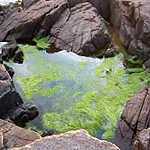Ulva intestinalis
From Wikipedia, the free encyclopedia
| Ulva intestinalis | |
|---|---|
 | |
| Scientific classification | |
| Kingdom: | Plantae |
| Phylum: | Chlorophyta |
| Class: | Ulvophyceae |
| Order: | Ulvales |
| Family: | Ulvaceae |
| Genus: | Ulva |
| Species: | U. intestinalis |
| Binomial name | |
| Ulva intestinalis (L.) | |
| Synonyms | |
| |
Ulva intestinalis is a green alga in the phylum Chlorophyta, of the genus Ulva (sea lettuce), also known by the common names gutweed and grass kelp.[citation needed] Until they were reclassified by genetic work completed in the early 2000s, the tubular members of the genus Ulva were in the genus Enteromorpha.
Distribution
It can be found in Bering Sea near Alaska, Aleutian islands, Japan, Korea, Mexico, and Russia.[1] Besides this, places it can be found in Israel, and in such European countries as Azores, Belgium, Denmark, Ireland, Norway, Poland, and in such seas as the Baltic and Mediterranean Sea.[2]
Description
The fronds of the species may be 10–30 centimetres (3.9–11.8 in) long and 6–18 millimetres (0.24–0.71 in) wide. They have rounded tips as well.[3]
In other languages
- Danish: Tarm-rørhinde
- Dutch: Echt darmwier
- French: Entéromorphe
- German: Darmtang or German: gemeiner Darmtang
- Norwegian: Bokmål tarmgrønske or Norwegian: Nynorsk tarmgrønske
- Polish: Sałata, Polish: Taśma or Polish: Watka[2]
- Swedish: Tarmalg
References
- ↑ "Ulva intestinalis". Seaweeed of Alaska. Retrieved March 24, 2013.
- ↑ 2.0 2.1 Guiry, M.D. (2012). "Ulva intestinalis Linnaeus, 1753". World Register of Marine Species. Retrieved March 24, 2013.
- ↑ "Gut weed - Ulva intestinalis". Retrieved March 24, 2013.
| External identifiers for Ulva intestinalis | |
|---|---|
| Encyclopedia of Life | 966848 |
| NCBI | 3116 |
| WoRMS | 234471 |
| Also found in: AlgaeBase | |
This article is issued from Wikipedia. The text is available under the Creative Commons Attribution/Share Alike; additional terms may apply for the media files.